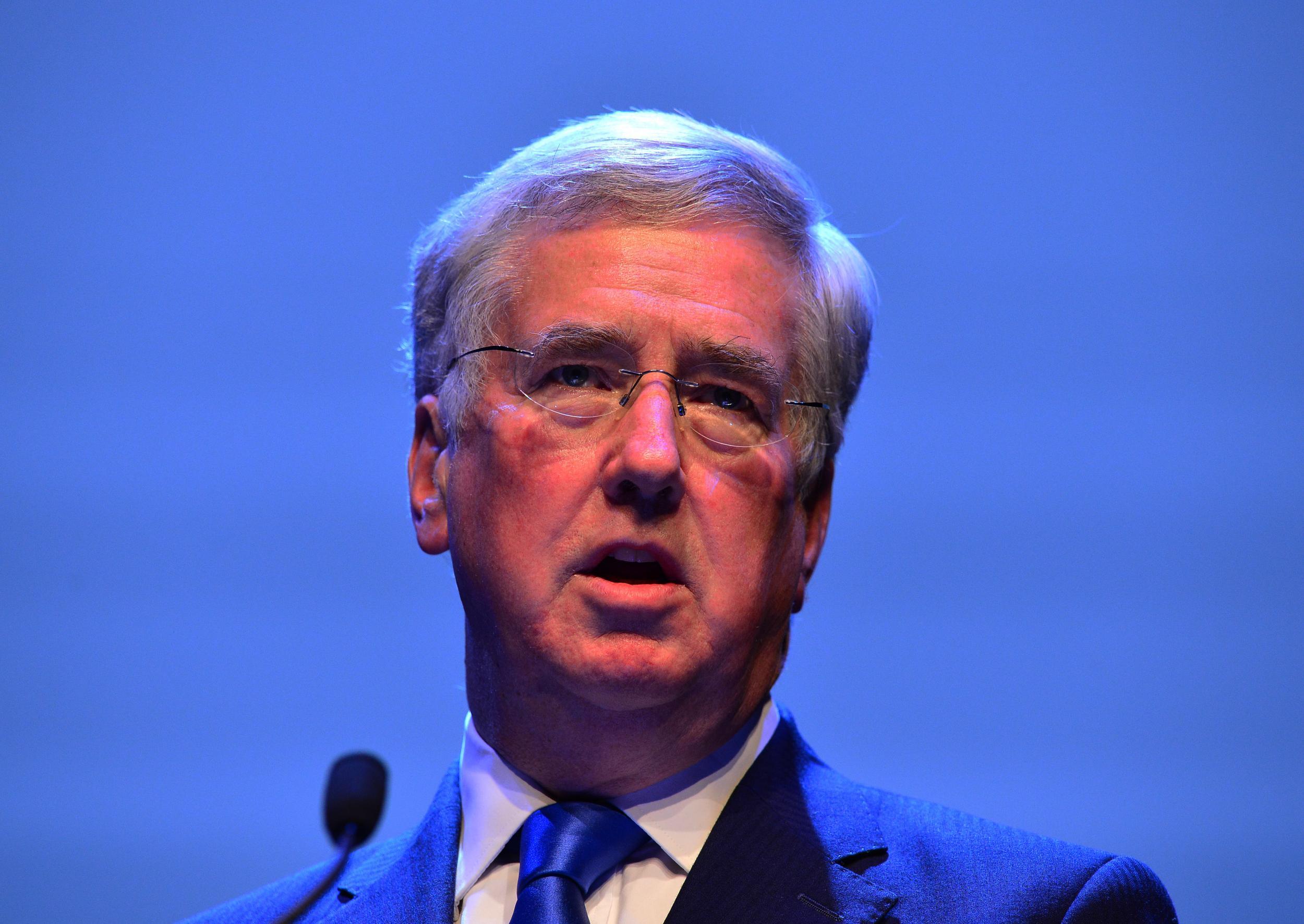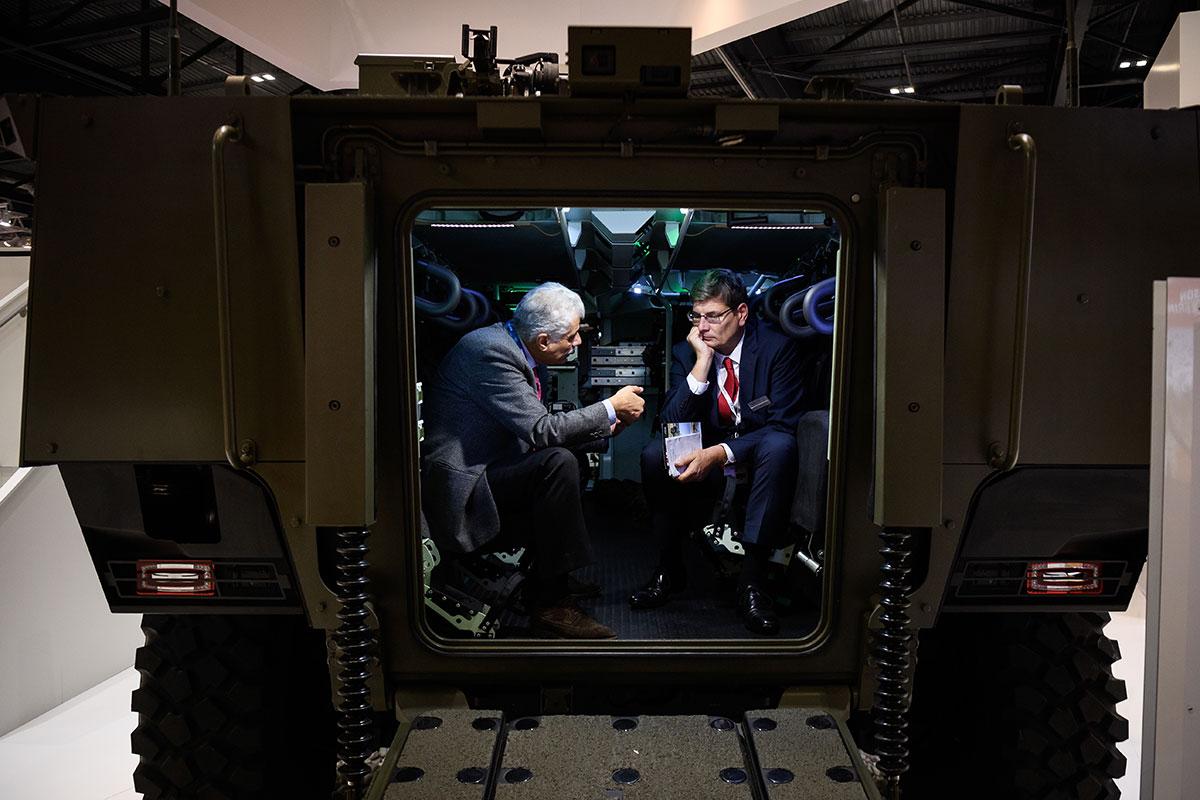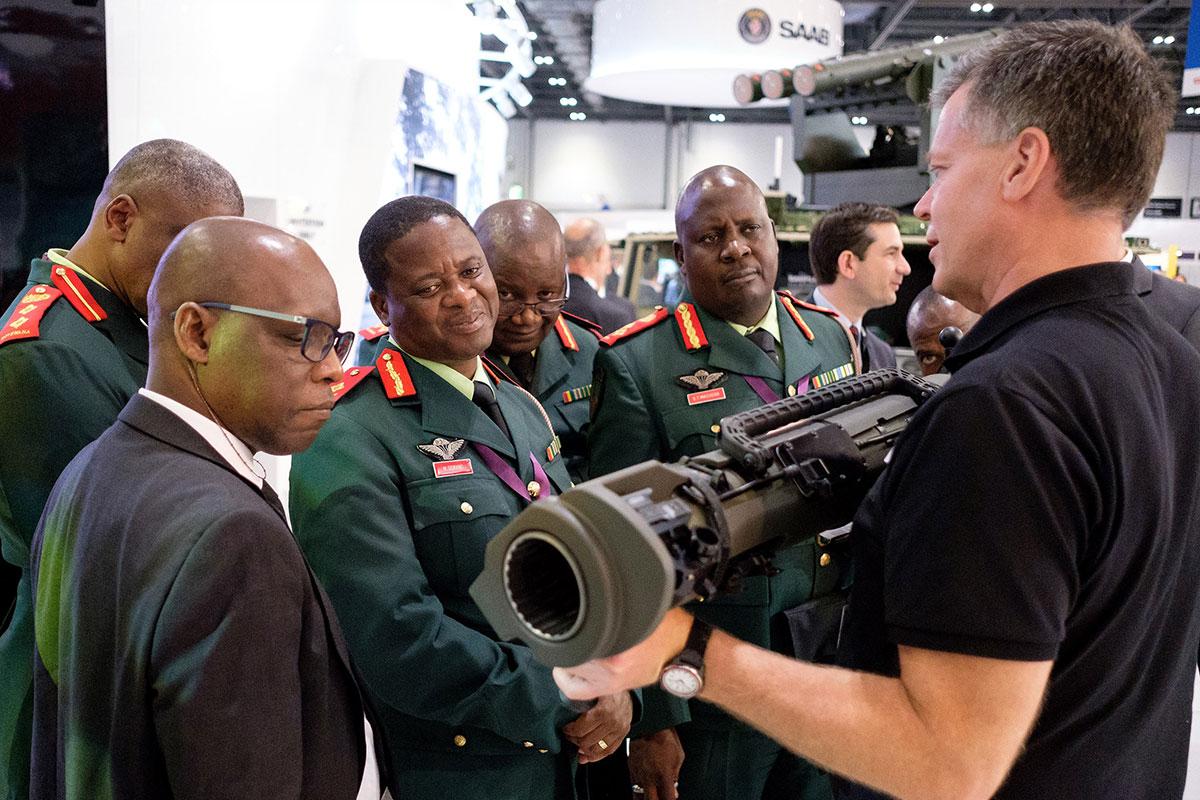DSEI 2017: Michael Fallon outlines vision for increasing UK arms trade after Brexit
Defence Secretary tells arms fair increased conflict and terror pushing demand 'through the roof'

Your support helps us to tell the story
From reproductive rights to climate change to Big Tech, The Independent is on the ground when the story is developing. Whether it's investigating the financials of Elon Musk's pro-Trump PAC or producing our latest documentary, 'The A Word', which shines a light on the American women fighting for reproductive rights, we know how important it is to parse out the facts from the messaging.
At such a critical moment in US history, we need reporters on the ground. Your donation allows us to keep sending journalists to speak to both sides of the story.
The Independent is trusted by Americans across the entire political spectrum. And unlike many other quality news outlets, we choose not to lock Americans out of our reporting and analysis with paywalls. We believe quality journalism should be available to everyone, paid for by those who can afford it.
Your support makes all the difference.Britain will “spread its wings across the world” with increased arms and equipment exports after Brexit, the Defence Secretary has said.
Addressing the world’s largest arms fair in London, Sir Michael Fallon outlined his vision for the UK to take a bigger share of the international defence market and claimed demand was going “through the roof” because of increasing war and terror.
Hailing programmes to build frigates, marine patrol aircraft and the F-35 fighter jet, the Defence Secretary claimed the industry could strengthen international alliances.
“As we look, exiting the European Union, to go increasingly global, we see our equipment as a platform for even stronger partnership,” Mr Fallon told delegates, including international military commanders.
“As we look to life post Brexit and spread our wings further across the world, it’s high time we do more to compete for a share of this international export market.”
Mr Fallon said the UK secured defence orders totalling £5.9bn in 2016 and is already the world’s second-largest weapons exporter.
“But now it’s time to build exportability into our thinking from the off, aligning it with the requirements of international clients,” he added.
Sir Michael said the defence industry would “hit new heights” promoting British manufacturing and international partnerships.
But the Defence Secretary faced awkward questions about some of Britain’s “clients”, who include totalitarian regimes and nations accused of perpetrating war crimes.
He refused to say whether the UK would halt its training programme for the Burmese military, which is accused of massacring Rohingya Muslims and burning their villages to the ground in what the UN called “textbook ethnic cleansing”.
Mr Fallon was speaking at the Defence and Security Equipment International (DSEI) event in London, where cabinet colleague Liam Fox had defended British weapons sales a day earlier.
The International Trade Secretary claimed the UK had one of the most sophisticated export licensing regimes in the world, designed to ensure that British-made weaponry was not used to endanger international security.
“There are robust safety measures to allow ethical defences exports to flourish, protected by a licensing system to ensure exports are rational and lawful and which guarantees that we do not in the process violate international law, create tensions, promote terrorism or endanger global security,” he added.
“If nations and peoples have an inalienable right to look after their own defence, those of us from advanced economies must remember that if we do not provide countries with means of defending themselves, then we will see a proliferation of uncontrolled and unregulated arms sales free from oversight or inhibitions.”
Humanitarian groups have repeatedly called for Britain to stop licensing arms exports to Saudi Arabia, which is accused of using UK weapons to bomb civilian targets in Yemen.
Mr Fallon did not directly refer to the ongoing conflict in his 30-minute keynote speech, where he cited threats including North Korea, Russian “aggression”, cyber attacks, Isis and terrorism.

“As the danger proliferates, defence’s stock rises and the demand for the best kit goes through the roof,” he added.
“And today you’ll find us making maximum use of our capability.”
Mr Fallon said the UK was increasing its defence budget by 0.5 per cent each year to reach £37bn in 2018.
New weapons include Dreadnought submarines, Apache attack helicopters, Ajax armoured vehicles, F35s and frigates.
The UK is also working to develop artificial intelligence for use in warfare, including a “ship’s brain”, as well as advanced robots.
Mr Fallon announced Britain is buying 56 bomb disposal robots from Harris Corporation, as well as commissioning a £10m “active protection system” for armoured vehicles frequently targeted by missiles and IEDs.
He said “science fiction has become science fact”, hailing a prototype laser weapon called Dragonfire on display at the exhibition, adding: “You come to DSEI to be wowed and I hope we’ve whetted your appetite.”
The Liberal Democrats warned that post-Brexit Britain must not become the “arms dealer of choice” for repressive regimes, after the speech.
The party's research previously found that in the past year, the UK has sold £1.2bn of military equipment to countries listed by the government as having poor human rights records, including Saudi Arabia, Venezuela and Burma.

Tom Brake, the Lib Dems' Brexit spokesperson, said: “Selling more weapons abroad will not compensate for the economic harm caused by an extreme Brexit. It will only do more damage to the UK’s standing in the world.”
Amnesty International UK urged the Government not to water down arms controls drawn up with European allies.
Oliver Feeley-Sprague, director of the charity's arms control programme, said: “For 25 years, close cooperation with our EU partners has brought about an important set of safeguards to help prevent arms sales that risk fuelling human rights violations.
“Michael Fallon’s remarks are the clearest signal yet that when it comes to UK-manufactured weapons, Brexit could mean a watering down of safeguards, more reckless arms sales and in turn greater civilian suffering around the world.”
Successive governments have been forced to defend Britain’s multibillion-pound weapons industry and the hosting of the controversial DSEI event.
Shortly after Mr Fallon’s speech, Labour leader Jeremy Corbyn hit out at the current UK regime for licensing arms.
A spokesperson said: “Jeremy has made clear that arms sales as they are must be strictly controlled and subject to clear human rights consideration. We have called for a suspension of arms sales to Saudi Arabia because of the what the Saudi regime is doing, and its role in Yemen and the large scale human rights abuses that have taken place.
“We want to see the existing rules and conditions on arms sales strictly adhered to, more strictly than they are now, and for that to govern how the arms trade operates.”
More than 100 protesters have already been arrested outside the ExCel centre in London, where they attempted to prevent exhibitors’ vehicles entering the venue.
A record number of 1,600 exhibitors from 54 countries are selling their wares at the four-day fair, which expects to attract 36,000 visitors and 2,500 international delegations.
It comes as the UK participates in arms control talks in Geneva, sparking allegations of double standards.
The Control Arms Coalition said it was “very clear where the Government’s priorities lie”.
The group’s director, Anna Macdonald, added: “It is sending in the ‘heavyweights’ Liam Fox and Sir Michael Fallon to deliver key note speeches at the arms fair and help seal million-pound contracts that could lead to the deaths of millions of civilians.
“But they have no ministerial representation at the Arms Trade Treaty Conference, where decisions made could save millions of lives.”
Join our commenting forum
Join thought-provoking conversations, follow other Independent readers and see their replies
Comments